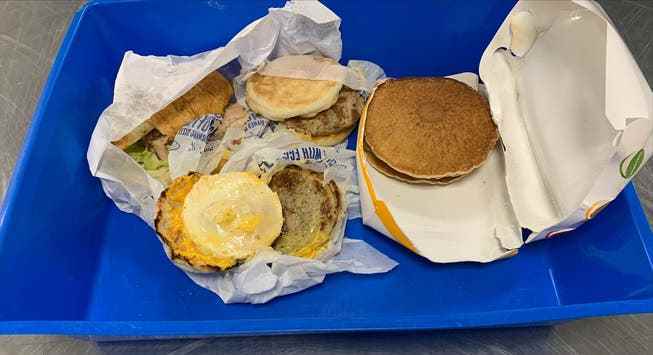A passenger attempting to enter Australia was fined for having two undeclared burgers in their luggage. The background is the strict requirements of the continent to keep epidemics away.
The undeclared burgers found by a dog in a traveler’s luggage in Darwin.
lips. This meal is likely to weigh heavily on its owner. A passenger bought two McMuffins with egg and beef and a ham croissant before leaving Bali – and was hit with a hefty fine when he arrived in Darwin, Australia.
The traveler has to shell out 2,664 Australian dollars, according to a statement from the competent authority. This corresponds to almost 1800 Swiss francs. “This will be the most expensive McDonald’s meal this passenger has ever eaten,” said Murray Watt, Australia’s Minister for Agriculture, Fisheries and Forestry. Because the fine is double the cost of a flight to Bali.
A passenger returning from Bali has just had the most expensive Maccas meal ever, with a $2664 fine after not declaring McMuffins & other meat products on arrival. If you do the wrong thing, you will be caught. Help keep Australia FMD-free. pic.twitter.com/gU2IS9tlMh
— Senator Murray Watt (@MurrayWatt) August 1, 2022
The background to the buses is Australia’s comparatively strict biosecurity regulations, which the island wants to use to keep invasive pests and diseases at bay. The authorities are particularly concerned about foot-and-mouth disease (FMD). After an outbreak of the disease in Indonesia, which also affected Bali, there is a heightened alert in Australia.
Dogs and floor mats are said to help against viruses
It was only in July that Anthony Albanese’s government announced increased measures for a total of 14 million Australian dollars to strengthen countermeasures in postal centers and airports. Specialized dogs are used at Darwin and Cairns airports. Likewise, hygienic floor mats have been introduced at all international airports, containing a citric acid solution to disinfect the soles of travelers’ shoes. “The spread of the virus would have serious consequences for animal health and trade in Australia,” the Ministry of Agriculture justified the tightening.
In the current case, Darwin’s new “biosafety detector dog Zinta” reacted to the passenger’s backpack. The traveler had not declared his potentially dangerous breakfast in his luggage and thus made himself liable to prosecution.
Anyone who travels to Australia and takes food with them usually has to declare it – the list of goods that must be declared ranges from meat to fruit and vegetables to herbs. How tightly Australia controls imports of potential pests is shown by the fact that even objects to which soil adheres must be declared.
The confiscated meat products would now be tested for foot-and-mouth disease and then destroyed, the Australian authorities said. “Australia is FMD free and we want it to stay that way,” said Minister Murray Watt.
